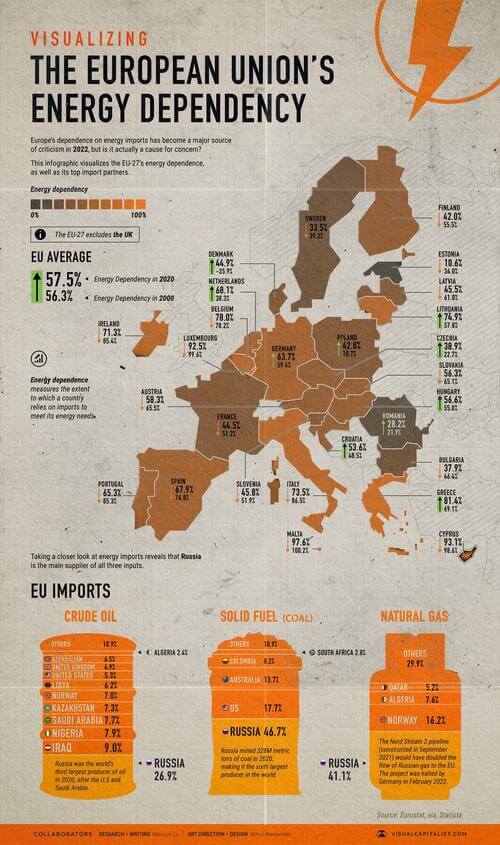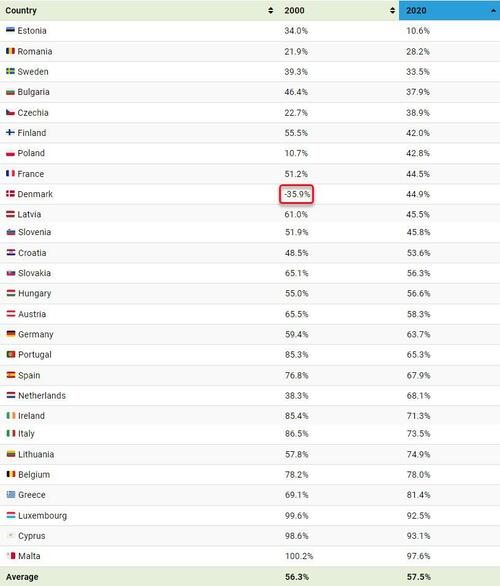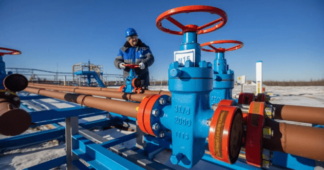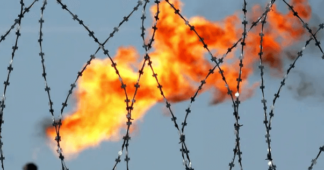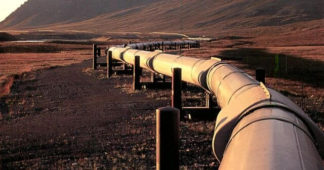by Tyler Durden
In response to Russia’s 2022 invasion of Ukraine, the U.S. and EU have imposed heavy sanctions aimed at crippling the Russian economy. However, as Visual Capitalist’s Marcus Lu details below, these bold actions also come with some potentially messy complications: Russia is not only one of the world’s largest exporters of energy products, but it is also Europe’s biggest supplier of these fuels.
As of October 2021, Russia supplied 25% of all oil imported by the EU, which is three times more than the second-largest trade partner. Naturally, the policies and circumstances that have led to this dependency have been under major scrutiny in recent weeks.
To help you learn more, this infographic visualizes energy data from Eurostat.
Energy Dependency, by Country
To start, let’s compare the energy dependence of each EU member, both in 2000 and 2020 (the latest year available). This metric shows the extent to which a country relies upon imports to meet its energy needs.
Note that Denmark’s value of -35.9% for the year 2000 is not a typo. Rather, it means that the country was a net exporter of energy.
Over this 20-year timeframe, the EU-27 average country’s energy dependence has increased from 56.3% to 57.5%, meaning EU members became slightly more reliant on energy imports over those two decades.
Where Do EU’s Energy Imports Come From?
Looking further into energy imports reveals that Russia is the main supplier of crude oil, coal, and natural gas. Continue below for more details.
Crude Oil Imports
The EU imports more crude oil from Russia than the next three countries combined.
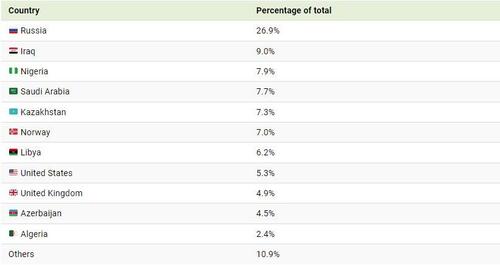
Coal Imports
Coal-fired power plants are still being used across the EU, though most member states expect to completely phase them out by 2030.

Natural Gas Imports
Natural gas is commonly used to heat buildings and water. A majority of the EU’s supply comes from Russia via the Nord Stream series of pipelines.

Nord Stream 2 is a recently constructed expansion which was expected to double the project’s capacity. Germany has since halted the approval process for this pipeline in response to Russia’s 2022 invasion of Ukraine.
What Happens Now?
In retaliation against Western sanctions, Russia has announced an impending ban on exports of certain goods and raw materials.
European gas prices skyrocketed in response, as many fear that Russia could cut off natural gas supplies. This, of course, would have very negative effects on both consumers and businesses.
In early March 2022, both the European Commission and the International Energy Agency (IEA) introduced proposals on how Europe could reduce its energy dependency.
We must become independent from Russian oil, coal and gas. We simply cannot rely on a supplier who explicitly threatens us.
– URSULA VON DER LEYEN, PRESIDENT OF THE EUROPEAN COMMISSION
Cutting off one’s biggest supplier is likely to cause issues, especially when dealing with something as critical as energy. Few countries have the capacity (or willingness) to immediately replace Russian imports.
The proposals also discussed options for boosting Europe’s domestic output, though the commission’s report notably excluded nuclear power. For various reasons, nuclear remains a polarizing topic in Europe, with countries taking either a pro or anti stance.
We remind our readers that publication of articles on our site does not mean that we agree with what is written. Our policy is to publish anything which we consider of interest, so as to assist our readers in forming their opinions. Sometimes we even publish articles with which we totally disagree, since we believe it is important for our readers to be informed on as wide a spectrum of views as possible.
